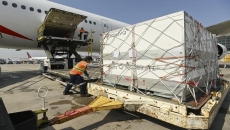Prime Minister Justin Trudeau opened the door on Monday to spending more on Canada’s military, but stopped short of any firm commitments even as Germany and other allies rush to shore up their defence budgets following Russia’s invasion of Ukraine
Speaking alongside his British and Dutch counterparts, Trudeau noted during a news conference in London that his government previously committed to a defence plan to spend hundreds of billions of additional dollars on the military.
“But we also recognize that the context is changing rapidly around the world,” Trudeau said.
“And we need to make sure that the women and men who served in the Canadian Armed Forces have all the equipment necessary to be able to stand strongly as we always have as members of NATO and we will continue to look at what more we can do.”
He did not directly respond to a question about whether Canada would finally commit to spending two per cent of its economic output on the military, after all NATO members agreed to the target in 2014.
NATO figures estimate Canada spent 1.39 per cent of its GDP on defence last year. The 2017 defence plan Trudeau referred to promised to inject $535 billion over 20 years into the military, which would get spending to about 1.5 per cent of GDP.
Successive Canadian governments have argued that dollars alone aren’t a sufficient measure of this country’s contributions to the NATO military alliance, and that its deployment of troops and equipment should count for more.
Germany dragged its feet on military spending for years, but on Feb. 27, three days after Russian troops began pouring into Ukraine, Chancellor Olaf Scholz said he would hike spending to exceed the NATO spending target.
Appearing alongside Trudeau on Monday, Dutch Prime Minister Mark Rutte said his nation was working toward it.
“We decided in early January … the new cabinet started to ramp up defense spending by billions of euros,” Rutte said. “That will bring us close to the two per cent, and probably we need to do more, particularly given what has happened over the last two weeks.”
British Prime Minister Boris Johnson noted at the event that his own country has already exceeded the two per cent target.
Defence analyst David Perry of the Canadian Global Affairs Institute said Canada spent years underfunding the military and is feeling that now as it faces the possibility of having to fight Russia with outdated equipment and critical gaps in its capabilities.
That includes decades-old fighter jets and warships, no dedicated equipment for the Canadian Army to protect itself from air attack, and a series of radars in the Canadian Arctic that can’t detect an attack on North America.
“We spent for about a decade one per cent or a little bit under, which has left us with the force we've got today,” Perry said. “We're only now at the front end of digging out of that.”
Perry said building up "usable military forces" can take decades of investment, so investing new cash won't have much impact in the short term.
He said one of the best things the government can do when it comes to the military is fix the procurement systems to make it less prone to the endless delays that have become the norm.
“One of the biggest things is we just we don't have a system that's designed to make decisions nimbly about anything,” he said.






